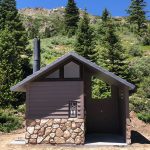Last-minute legislative proposal seeks to give Colorado firefighters a lifeline amid mounting challenges
Local districts say they are reeling from property tax cuts, increased calls for service and a struggle to recruit firefighters

Vail Daily archive
Fire districts in Colorado reeling from revenue cuts and workforce challenges could see a $50 million lifeline under a last-minute plan being proposed by state lawmakers in the final days of the legislative session.
House Bill 1078 initially sought to grow the workforce of state foresters and firefighters with grants for certifications, training initiatives and an outreach campaign to promote job opportunities. One of the earliest bills introduced this year, it languished for months as lawmakers struggled to find the funding amid a $1.2 billion budget shortfall.
But in a major revision last week, the bill’s grant provisions were stripped in favor of a no-interest loan program to help local fire districts pay for trucks, equipment and infrastructure improvements.
The loans, which would total $50 million, would be financed from the unclaimed property trust fund within the state treasurer’s office. Additionally, the bill would tap that fund to create a no-interest down payment and mortgage assistance program for firefighters to buy homes.
“We know that housing continues to be an issue on the Western Slope and in my district,” said Rep. Elizabeth Velasco, D-Glenwood Springs, a lead sponsor of HB 1078. “This is just another support for our fire districts to be able to continue to keep us safe.”
The push to aid fire districts comes amid compounding challenges.
Districts reported losing a combined $100 million in property tax revenue following a series of tax cuts from the legislature last year, according to Colorado State Fire Chiefs Executive Director Ken Watkins.
Property taxes are the primary revenue driver for local fire agencies, accounting for upwards of 90% of their budgets. At the same time, demands for service are increasing, with some districts seeing between a 20% and 25% increase in call volume, said Watkins, a longtime fire chief.
“Some of the districts have been in a pretty big bind because of the cost to provide services and the reductions in revenue,” he said.
Layoffs in the United States Forest Service earlier this year could also further strain local resources, as officials raise concerns over gaps in critical wildfire prevention and mitigation work.
Watkins said the latest proposal from lawmakers will provide needed support but added the $50 million in loans likely won’t be enough to fully relieve the pressure on fire districts.
“A new fire engine today costs about $1 to $1.2 million,” he said. “If you have 25 fire departments that need to buy a new fire engine and use this money for that, that’s half of the funding already.”
Fire chiefs remain in talks with lawmakers and Gov. Jared Polis to find more ways to help local agencies diversify their revenue streams and recruit and retain critical workers in their communities.
A bill that passed last session gives fire districts the ability to ask voters in their jurisdiction to approve a sales tax to help fund their operations. Several districts in Colorado have since held elections on sales tax hikes, with some measures successful and others failing.
“Working across state teams, we’ve helped the fire chiefs and state legislature identify and develop a number of potential opportunities that they may further develop and expand upon,” said Shelby Wieman, a governor’s office spokesperson, in a statement. “This session, (HB) 1078 is an example of this ongoing work.”
Watkins said other ideas may include allowing fire districts to levy new fees to further bolster their revenue. Because fees are not subject to the Taxpayer’s Bill of Rights, they could go into effect without a vote.
With only days left in the current session, however, those proposals will likely be punted to next year.
“There’s going to have to be more options available than just (HB 1078),” Watkins said.
Still, the bill is an important breakthrough for lawmakers seeking additional investments in firefighting resources amid a tight budget year. By leaning on the treasury’s unclaimed property fund, lawmakers are able to avoid dipping into the general fund, which is the state’s discretionary spending account and the source of this year’s budget cuts.
“We have about $1.2 billion in the (unclaimed property) fund, and we think this is a responsible use,” Velasco said. “We know that it’s in the interest of the state to continue supporting our fire districts.”
HB 1078 passed the House in a 37-27 vote and is currently pending in the Senate. The legislative session ends on May 7.
Injured skier has ‘incredible’ self-rescue below Castle Peak
There wasn’t much Marieta Bialek and Austin Zedak were concerned about.










